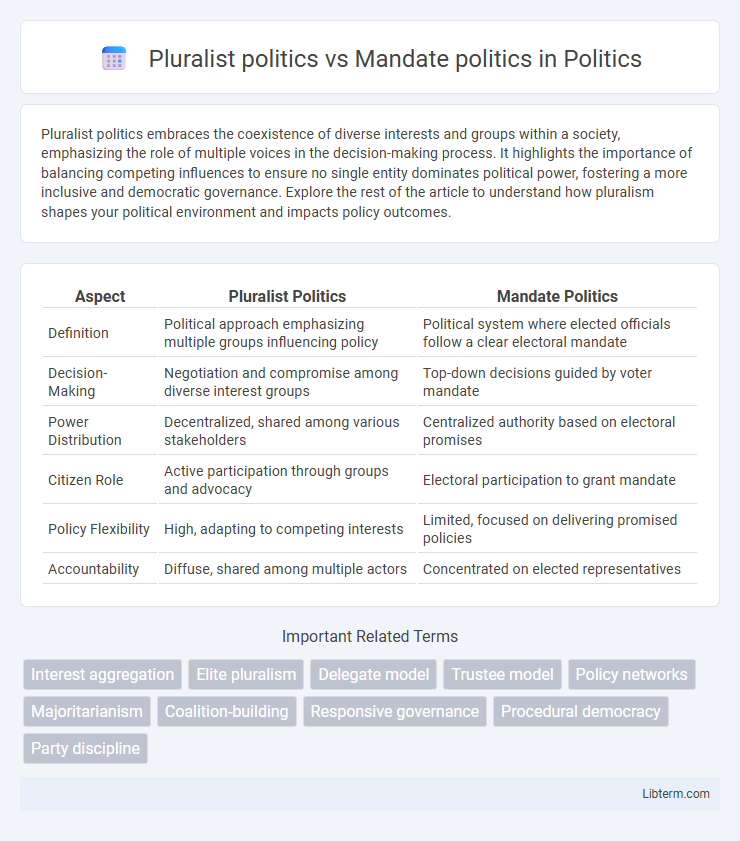Pluralist politics embraces the coexistence of diverse interests and groups within a society, emphasizing the role of multiple voices in the decision-making process. It highlights the importance of balancing competing influences to ensure no single entity dominates political power, fostering a more inclusive and democratic governance. Explore the rest of the article to understand how pluralism shapes your political environment and impacts policy outcomes.
Table of Comparison
| Aspect | Pluralist Politics | Mandate Politics |
|---|---|---|
| Definition | Political approach emphasizing multiple groups influencing policy | Political system where elected officials follow a clear electoral mandate |
| Decision-Making | Negotiation and compromise among diverse interest groups | Top-down decisions guided by voter mandate |
| Power Distribution | Decentralized, shared among various stakeholders | Centralized authority based on electoral promises |
| Citizen Role | Active participation through groups and advocacy | Electoral participation to grant mandate |
| Policy Flexibility | High, adapting to competing interests | Limited, focused on delivering promised policies |
| Accountability | Diffuse, shared among multiple actors | Concentrated on elected representatives |
Introduction to Pluralist and Mandate Politics
Pluralist politics centers on the competition among diverse interest groups to influence policy-making, emphasizing decentralized power and multiple access points within the political system. Mandate politics stresses the authority elected officials derive directly from voter mandates, highlighting a more centralized decision-making process based on election outcomes. Understanding the distinction clarifies how political accountability and policy responsiveness vary in democratic governance models.
Defining Pluralist Politics
Pluralist politics is defined by the presence of multiple competing interest groups that influence policy decisions through negotiation and compromise, ensuring no single entity dominates the political landscape. It emphasizes decentralized power, diverse participation, and the balancing of varied interests within democratic governance. Pluralist politics contrasts with mandate politics, which relies on a singular, authoritative mandate to implement policies without extensive negotiation among groups.
Understanding Mandate Politics
Mandate politics centers on elected representatives acting on a clear, publicized platform reflecting the explicit will of voters, emphasizing direct accountability and political legitimacy derived from electoral promises. Unlike pluralist politics, which involves negotiation among diverse interest groups and power sharing, mandate politics assumes a unified policy direction and decisive governance based on majority electoral mandates. This approach prioritizes strong leadership and coherent policy implementation to fulfill electoral commitments, often reducing the influence of competing interest groups.
Key Differences Between Pluralist and Mandate Politics
Pluralist politics emphasizes diverse interest groups competing to influence policy, fostering a decentralized decision-making process, while mandate politics centers on a clear, unified electoral mandate given to representatives to implement specific policies. In pluralist systems, power is dispersed across multiple stakeholders, enabling negotiation and compromise, whereas mandate politics concentrates power within elected officials acting on voters' explicit demands. These fundamental differences impact policymaking dynamics, with pluralist politics promoting inclusivity and mandate politics prioritizing decisive governance based on electoral legitimacy.
Historical Origins and Evolution
Pluralist politics originated in early 20th-century democratic theory, emphasizing diverse interest groups competing for influence within a decentralized political system. Mandate politics evolved from representative democracy principles in the mid-20th century, framing elected officials as agents obligated to implement explicit electoral promises. Both concepts reflect distinct historical efforts to balance citizen participation and political accountability in evolving democratic institutions.
Major Theorists and Influential Ideas
Pluralist politics, championed by theorists like Robert Dahl, emphasizes diverse, competing interest groups that facilitate democratic governance through negotiation and power diffusion. Mandate politics, influenced by scholars such as Margaret Canovan, prioritizes the electorate's clear mandate given to political leaders, stressing accountability and policy implementation driven by electoral promises. The core debate centers on whether democracy functions best through dispersed power among pluralities or centralized authority reflecting electorate mandates.
Advantages of Pluralist Approaches
Pluralist politics promotes diverse interest representation, enhancing democratic participation by allowing multiple groups to influence policymaking. This approach fosters compromise and prevents dominance by any single faction, ensuring a more balanced and inclusive political environment. Pluralism also encourages transparency and responsiveness from elected officials who must consider a wider range of constituent preferences.
Criticisms and Limitations of Mandate Politics
Mandate politics often faces criticism for oversimplifying complex voter preferences by assuming electoral victory grants a clear, unified public mandate, which can undermine pluralist democratic principles that emphasize diverse interests and deliberation. This approach risks marginalizing minority voices and neglecting the nuanced, often conflicting demands within a heterogeneous electorate. Furthermore, mandate politics may encourage authoritarian tendencies by justifying unilateral decision-making under the guise of electoral legitimacy, limiting checks and balances essential in pluralist governance systems.
Impact on Democratic Governance
Pluralist politics fosters democratic governance by encouraging diverse interest groups to compete, enhancing representation and policy responsiveness. Mandate politics centralizes decision-making power under elected officials who claim a clear electoral mandate, which can streamline policy implementation but may reduce inclusivity. The tension between these models influences the balance between participatory democracy and effective government action.
Contemporary Examples and Case Studies
Pluralist politics emphasize diverse interest groups competing for influence, as seen in the United States where lobbying by various sectors shapes policy outcomes. Mandate politics occurs when elected officials claim a clear public mandate to pursue specific policies, exemplified by Emmanuel Macron's 2017 French presidential victory enabling swift reforms. Contemporary case studies reveal pluralism's impact in multi-party democracies like India, while mandate politics is prominent in countries with dominant-party systems such as Turkey under Recep Tayyip Erdogan.
Pluralist politics Infographic

 libterm.com
libterm.com